Resources
Asynchronous online instruction has become increasingly popular in the field of religious studies. However, despite voluminous research on online learning in general and numerous articles on online theological instruction, there has been little discussion of how to effectively design and deliver online undergraduate courses in religious studies. Drawing on recent research, experiences teaching and learning online, and interviews with colleagues, this paper discusses key principles of effective online instruction. It recommends instructors focus on humanizing their course website, “chunking” their course content, making their approach to the study of religion clear, structuring and monitoring online discussions, prioritizing prompt and constructive feedback, and making course material relevant to learners.
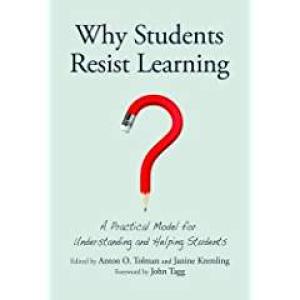
Click Here for Book Review However personally committed faculty may be to helping students learn, their students are not always as eager to participate in this endeavor, and may react with both active and passive resistant behaviors, including poor faculty evaluations. The purpose of this book is to help faculty develop a coherent and integrated understanding of the various causes of student resistance to learning, providing them with a rationale for responding constructively, and enabling them to create conditions conducive to implementing effective learning strategies. In this book readers will discover an innovative integrated model that accounts for student behaviors and creates a foundation for intentional and informed discussion, evaluation, and the development of effective counter strategies. The model takes into account institutional context, environmental forces, students’ prior negative classroom experiences, their cognitive development, readiness to change, and metacognition. The various chapters take the reader through the model’s elements, exploring their practical implications for teaching, whether relating to course design, assessments, assignments, or interactions with students. The book includes a chapter written entirely by students, offering their insights into the causes of resistance, and their reflections on how participating on this project has affected them. While of great value for faculty, this book is also useful to faculty developers advising future and current faculty, as well as to administrators, offering insight into how institutional values impact teaching practice and student attitudes. (From the Publisher)
Race continues to be a significant issue on campus. Underrepresented college students at low-diversity institutions reported more incidents of stereotyping, discrimination and harassment on campus. Data indicate more hospitable racial climates on the most diverse campuses and suggest that campuses must continue to work to improve intergroup relations even as enrollments begin to change. 
The millennial generation is distinctive for several reasons, not the least is its growing religious disaffiliation. Given a growing disinterest in religion in general and the Bible in particular especially among the fast growing group of millennial “nones” how can biblical studies classes still be seen as appealing and relevant? This article seeks to answer this question by examining the identity and concomitant values of millennials. As a result of this analysis I argue that while the Bible as inherent authority may be quickly losing its appeal, the Bible as an example of human creativity, group reflection, political rhetoric, and social discourse makes the study of the Bible particularly relevant for millennials contemplating careers in the global marketplace even if the importance of the Bible itself is waning for this generation. I show how in my introductory New Testament class I attempt to implement these ideas.
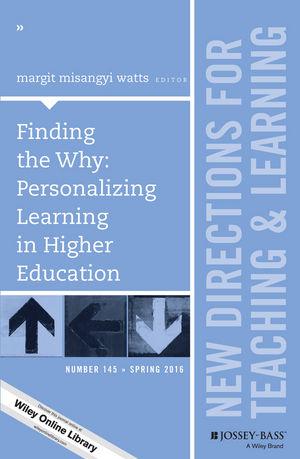
Click Here for Book Review Abstract: This volume addresses how we might help students find the “why” of their educational endeavors. The ideas found in this volume range from: - changing the perceptions and attitudes of whole communities toward education, - retuning the first year experience to give students more opportunities to find meaning in their learning, - suggesting new ways of integrating students’ experiences with their learning in core courses, and - connecting major initiatives already in place to demonstrate how we might restructure undergraduate education through the content of the curriculum, the way we teach, and our curricular learning experiences. This is the 145th volume of this Jossey-Bass higher education series. It offers a comprehensive range of ideas and techniques for improving college teaching based on the experience of seasoned instructors and the latest findings of educational and psychological researchers. (From the Publisher)
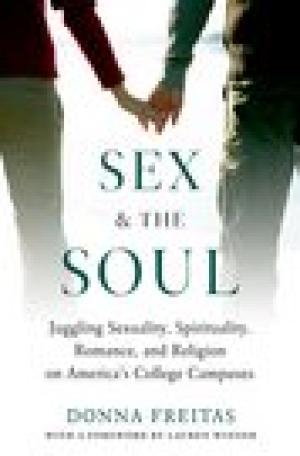
Based on dozens of face-to-face interviews, Sex and the Soul explores the sexual and spiritual lives of today's college students. Donna Freitas crisscrossed the country, visiting a range of America's colleges and universities--from public to private, Catholic to evangelical--to find out what students had to say about these highly personal subjects. Their stories will not only engage readers, but, in many cases, move them with the painful struggles these candid young women and men face. Indeed, the book uncovers aspects of college life that may unsettle some readers, especially parents. Many campuses, for instance, are dominated by the pervasiveness of hook-up culture. Moreover, many students see little connection between sex and religion, even as they seek one between sex and spirituality. Indeed, these observations hold true even at Catholic schools. Only at evangelical colleges is religion an important factor when deciding whether or not to engage in sex. But Freitas's research also reveals that, even at secular schools, students are not comfortable with a culture of casual sex, and that they do want spirituality, at least, if not also religion, to speak about what they should do and who they should try to be--not just what they should avoid doing. Sex and the Soul will offer readers the chance to hear college students speaking honestly about extremely sensitive topics, in a book that will be of great interest to students, parents, clergy, teachers, and anyone who wants to know what's happening on today's college campuses. (From the Publisher)
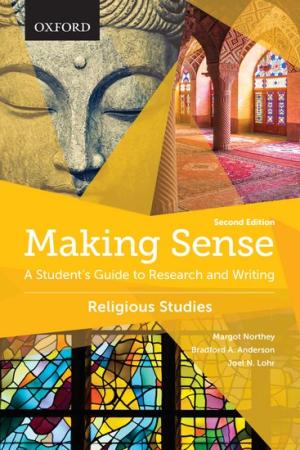
Click Here for Book Review Abstract: Features an overview of research and writing for students in religious studies, for a reasonable price, and can be used as a resource for a student's entire academic career. Uses straightforward language to discuss the basics of research and writing. Instructors agree that as an overview, the Making Sense series is much easier to digest than heavier writing style guides, and they appreciate the discipline-specific content. Features up-to-date guidelines for documentation and referencing and provides the most current guidelines for documentation in religious studies, including coverage of MLA, APA, and Chicago styles and referencing. Along with including the most up-to-date citation styles, the Making Sense series also features current examples, and useful information on using the internet as a research tool. More Accessible. This edition contains more bulleted points and summaries to make the content easier to reference and absorb. New to this Edition: Chapters are reordered to better match the writing and learning process Includes comprehensive coverage of new developments in technology-based research and writing Sections on MLA, APA, and Chicago style have been revised to be completely up to date (From the Publisher)
This essay explores classroom dynamics when students identify and connect their own painful experiences to structural racism or ethnocentrism exhibited in the Holocaust or parts of Jewish history. The intrusion of this proximal knowledge can be an obstacle to student learning. If engaged by professors, however, I argue that proximal knowledge can be a catalyst that promotes learning. Social scientific theory provides a useful lens for helping students to better grasp and contextualize both their old experiences and the new materials that are being taught in the course within the larger structural frames of race, religion, and ethnicity that they have selected, but may not fully appreciate. Reflective guided journaling is an essential part of the learning experience.
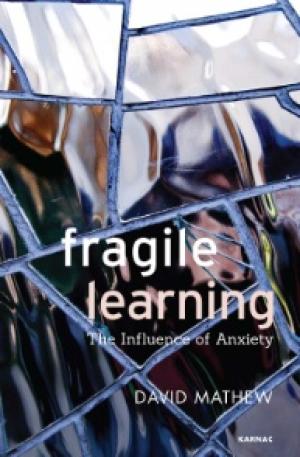
Click Here for Book Review Abstract: What are the barriers and obstacles to adults learning? What makes the process of adult learning so fragile? And what exactly do we mean by fragile learning? This book addresses these questions in two ways. In Part One, it looks at challenges to learning, examining issues such as language invention in a maximum security prison, geography and bad technology, and pedagogic fragility in Higher Education. Through a psychoanalytic lens, Fragile Learning examines authorial illness and the process of slow recovery as a tool for reflective learning, and explores ethical issues in problem-based learning. The second part of the book deals specifically with the problem of online anxiety. From cyberbullying to Internet boredom, the book asks what the implications for educational design in our contemporary world might be. It compares education programs that insist on the Internet and those that completely ban it, while exploring conflict, virtual weapons and the role of the online personal tutor. The book also examines the issue of time as a barrier to learning and its links to unconscious thinking, as well as defining fragility in a summative essay. Using real-life examples, originality and wit, Fragile Learning is an important contribution to the field of psychoanalysis and pedagogy. (From the Publisher)
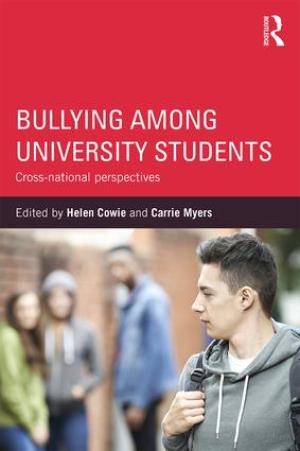
Click Here for Book Review Abstract: Bullying Amongst University Students is a pioneering collection of knowledge and evidence exploring the under-researched phenomenon of bullying in universities. Abusive behaviour amongst young people is a serious and pervasive problem that is exacerbated by the rapid advances in electronic communication, and in this book the authors highlight the problem and proceed to facilitate new practices and policies to address it. This book brings together an international team of authors from a range of disciplines, encompassing education, psychology, criminology, law and counselling, who have carried out research in the area of university bullying. Addressing critical dialogues and debates, the authors explore peer on peer violence, intimidation and social exclusion before considering its effects on students and making recommendations for action and further research. Key topics include: • Cyberbullying and cyber aggression • Rape culture across the university • Homophobic and transphobic bullying • The impact of bullying on mental health • The role of bully and victim across the lifespan • Policies and procedures to address bullying International in authorship and scope, this book will be an invaluable resource for students and researchers in fields such as education, psychology, sociology, health studies and criminology. It is also essential reading for university policy-makers and union representatives responsible for the emotional and physical well-being of students. (From the Publisher)